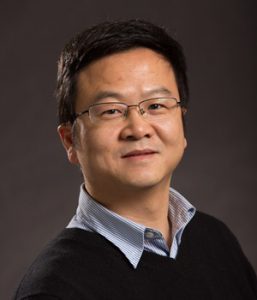

Qian Liao, professor, civil & environmental engineering, was awarded $275,000 from the National Science Foundation (NSF) in August for a five-year Phase III project that aims to expand on the research being conducted through the Water Equipment and Policy Center (WEP), where he is director.
WEP is an Industry/University Cooperative Research Center (I/UCRC) operating under the auspices of the NSF. Created and led by UWM, it is a catalyst for innovation in North America’s water industry. In addition to funding from the NSF, each of WEP’s industry members contributes $50,000 annually and participates in determining research needs, project selection and mentorship.
In the past decade, WEP-affiliated researchers have completed nearly 100 projects with a total fund of $4.5 million that address critical technological needs in clean water delivery and inform water policy makers, says Liao. With the emphasis on technology transfer to industrial practices, WEP research has led to more than a dozen patent applications and 23 signed license agreements with its industrial members.
The Phase III project, Liao says, will capitalize on this success by adding customer discovery, expanding the research team, refining the technology roadmap, exploring new frontiers of water science for breakthrough technologies, and training a talented workforce to meet the nation’s needs in drinking water quality and wastewater management.
WEP’s research is providing water industry with solutions to energy conservation, emerging contaminants and more
WEP brings together faculty researchers—from UWM and Marquette University—industry and government agencies. “At any time,” Liao says, “WEP is working with close to 20 companies and state government agencies, and about 10 faculty members on funded research projects.”
This vital research covers four areas–water sensors, novel materials, innovative treatment systems, and water policy research. All research aims to provide industry with new products and solutions that address point-of-use technologies, emerging contaminants, sustainability, and energy conservation.
UWM-led projects are providing products and solutions to help manage water resources
UWM-led research projects at WEP are helping the world manages its acutely stressed water resources and include: real-time and low-cost water sensors that can detect contaminants in drinking water or reduce water leaks; novel biocide coatings; self-healing and anti-fouling materials; and advanced technologies and processes that remove or destroy contaminants (such as arsenic, bacteria, and polyfluoroalkyl substances, or PFAS) from drinking water.
Over the past decade, 25 UWM faculty researchers and dozens of students have been involved in WEP projects.
The following UWM faculty members contributed to the Phase III NSF proposal:
- Rebecca Klaper, associate dean, professor, director of the Great Lakes Genomics Center
- Xiaoli Ma, assistant professor, materials science & engineering
- Junjie Niu, associate professor, materials science & engineering
- Michael Nosonovsky, associate professor, mechanical engineering
- Krishna Pillai, professor, mechanical engineering
- Pradeep Rohatgi, State of Wisconsin and UWM Distinguished Professor, materials science & engineering
- Nathan Salowitz, associate professor of mechanical engineering, affiliate professor of electrical and civil engineering
- Marcia Silva, adjunct professor in the college and director of the Water Technology Accelerator
- Yin Wang, associate professor, civil & environmental engineering
- Shangping Xu, associate professor, geosciences